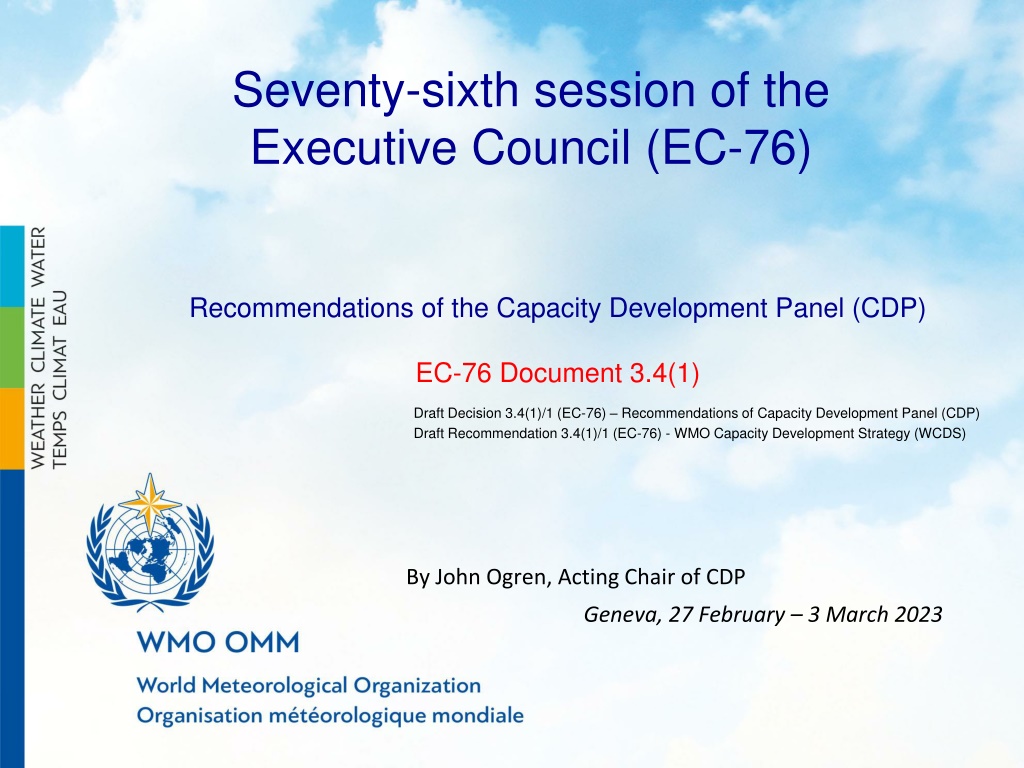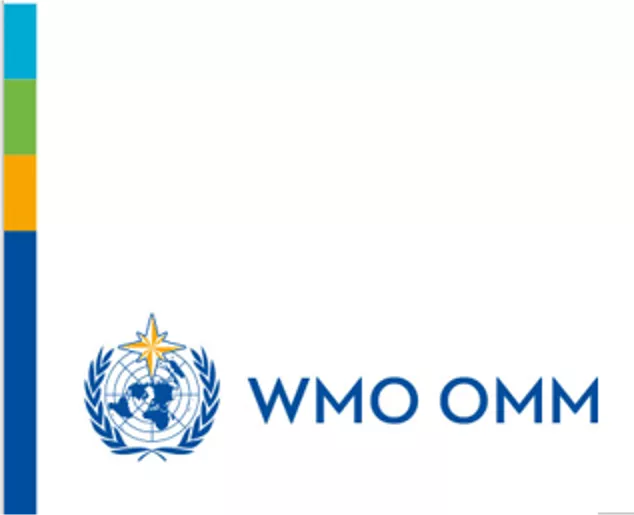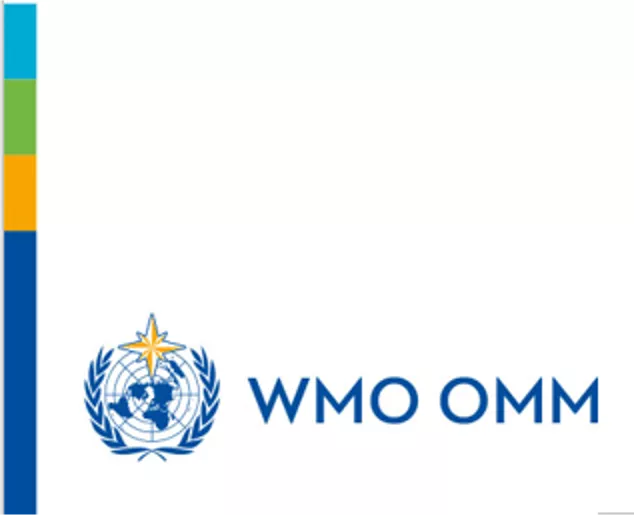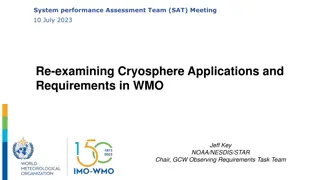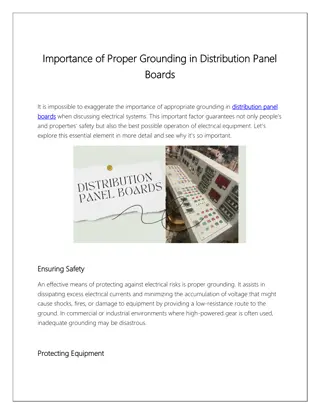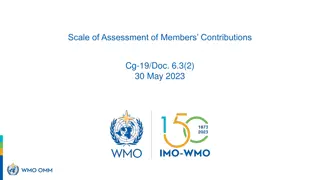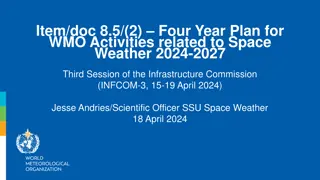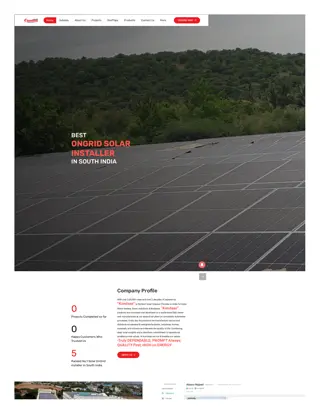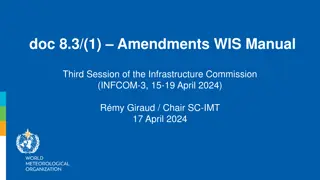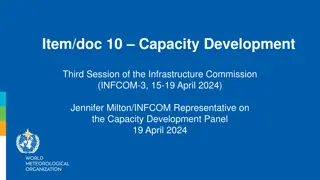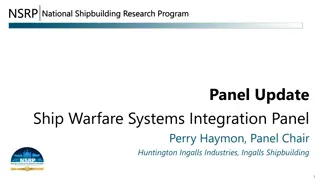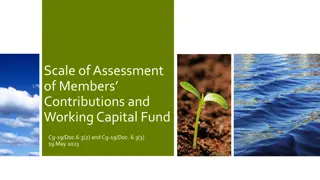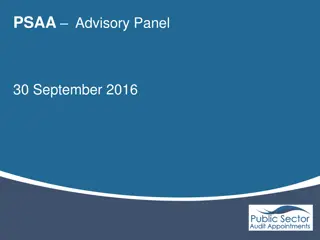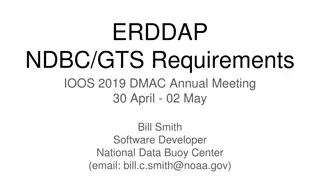WMO Capacity Development Panel Overview
The Capacity Development Panel (CDP) of the WMO, established in 2019, focuses on providing guidance and feedback to enhance capacity development within the organization. It consists of Expert Teams and a Task Team working on various aspects such as policy development, human resources, resource mobilization, and revision of the Capacity Development Strategy. The Panel's activities aim to complement existing initiatives, prioritize value-added tasks, and address key development needs across different regions. It also collaborates with WMO departments to ensure compliance with standards and practices.
Download Presentation

Please find below an Image/Link to download the presentation.
The content on the website is provided AS IS for your information and personal use only. It may not be sold, licensed, or shared on other websites without obtaining consent from the author.If you encounter any issues during the download, it is possible that the publisher has removed the file from their server.
You are allowed to download the files provided on this website for personal or commercial use, subject to the condition that they are used lawfully. All files are the property of their respective owners.
The content on the website is provided AS IS for your information and personal use only. It may not be sold, licensed, or shared on other websites without obtaining consent from the author.
E N D
Presentation Transcript
Seventy-sixth session of the Executive Council (EC-76) Recommendations of the Capacity Development Panel (CDP) EC-76 Document 3.4(1) Draft Decision 3.4(1)/1 (EC-76) Recommendations of Capacity Development Panel (CDP) Draft Recommendation 3.4(1)/1 (EC-76) - WMO Capacity Development Strategy (WCDS) By John Ogren, Acting Chair of CDP Geneva, 27 February 3 March 2023
General Considerations about the Capacity Development Panel The Capacity Development Panel (CDP) was established in 2019 by Resolution-7 (EC-71) The first meeting of the Panel was held in August 2020, marking the start of its work and the established four Expert Teams (ET) and one Task Team (TT) to assist with work under the responsibility appointed to the Panel: 1. Expert Team on Policy Development and Institutional Matters (CDP-ET-PDIM) 2. Expert Team on Human Resources Development, Education and Training (CDP-ET-HRDET) 3. Expert Team on Capacity Development through WMO Technical Departments (CDP-ET-TDs) 4. Expert Team on Capacity Development through Resource Mobilization, Partnerships and Development Assistance (CDP-ET-RMPDA) 5. Task Team on Revision of WMO Capacity Development Strategy (CDP-TT-WCDS)
Capacity Development Panel Focus and activities 2020-2022 The aim of activities of the Panel has been to add value to the work of WMO by providing feedback and guidance rather than implementing specific capacity development activities, much of which is already being done elsewhere across WMO, and by Members. Assisting with the effective coordination of capacity development across WMO, which is believed to be central to the TORs of the Panel Considering feedback and requests from relevant WMO bodies, including from Congress and EC. FOCUS OF CDP Complementing, rather than duplicating, any other work in the CDP-ETs and across WMO Ensuring that priority is given to those activities that will add most value EXPERT TEAMS & TASK TEAM CDP-ET-RMPDA Expert Team on Capacity Development through Resource Mobilization, Partnerships and Development Assistance CDP-TT-WCDS Task Team on Revision of WMO Capacity Development Strategy CDP-ET-PDIM CDP-ET-TDs Expert Team on Capacity Development through WMO Technical Departments CDP-ET-HRDET Expert Team on Human Resources Development, Education and Training Expert Team on Policy Development and Institutional Matters I. Assessment of key development needs/gaps in each Region (including consideration of significant upcoming initiatives under the Technical Commissions and Research Board) to feed into the revised Capacity Development Strategy (CDS). VI. Review and document recommendations on best practice in terms of working with development partners/Government (to enhance knowledge sharing in this area). XI. Review and update of the Basic Instructional Packages for Meteorologists and Meteorological Technicians (WMO-No. 1083). XVI. Activities in close collaboration with the appropriate departments in the Secretariat as well as with WMO Bodies and Technical Commissions. XVII. Assessment of current gaps to compliance of members to WMO standards and recommended practices including identification of gaps in policies addressing capacity and free exchange of data Feedback. VII. To conduct an assessment of, and clarify the roles and responsibilities of, the different actors as well as the different funding mechanisms involved in WMO Capacity Development activities . II. Review of current data collection platforms and methodologies and providing recommendations on how best to manage/streamline. XII. Elaboration of concept for the Consortium of WMO Education and Training Collaborating Partners CONECT. ACTIVITIES & ACHIEVEMENTS 2020-2022 VIII. Make recommendations and develop strategies to strengthen sub-regional, regional, inter-regional and other cooperation groups in order to establish synergies at inter-regional and sub-regional levels and to identify training and capacity-building opportunities. III. Review of/guidance on, significant WMO capacity development initiatives and feedback to EC e.g. Country Hydromet Diagnostics tool, SOFF, others TBD in discussion with relevant WMO departments/programmes. XVIII. Compiling best practices from the National Meteorological and Hydrological Services (NMHSs) considered to be meeting global standards in the delivery of services. This compilation to be used in the promotion of standards worldwide. XIII. Support and review a publication on leadership and management. XIV. Collection of RTCs Successful Capacity Development practices and innovations implemented (locally and Regionally), Priority/needs and Recommendations. XIX. Communicating and promoting global meteorology, hydrology and climatology including authoritative voice common standards and product sharing. IX. Assistance to the external review process and reconfirmation of status of WMO Regional Training Centres. IV. Support of the independent evaluation of WMO projects as requested by EC-72. V. Input into guidance/recommendations on the facilitation of twinning arrangements and other innovative modes of bilateral cooperation, and best practice for taking forward. XV. Contribution to the WCRP Forum for South America. XX. Revision of the WMO Capacity Development Strategy. X. Organization of SYMET-14. The full report of work completed by CDP since 2020 is presented in the EC-76/INF.2.5(5)
Draft Decision 3.4(1)/1 (EC-76) Recommendations of Capacity Development Panel (CDP) Being the first time WMO has set up a Capacity Development Panel to advise the Executive Council, it provides a good opportunity to learn from the current setup and reflect on opportunities to improve conditions on future work as the Panel continues its function post-Congress 2023. Some challenges faced by the Panel: Late approval of member nominations Limited number of members implementing activities of the Panel Wide and general nature of the ET Terms of Reference Despite the challenges, a significant amount of work was completed, resulting in valuable achievements and recommendations. The full list of recommendations of CDP is presented in Draft Decision 3.4(1)/1 (EC-76)
Recommendations of Capacity Development Panel (CDP) 1. To request Members to: (a) Note the recommendations made in Education and Training in a Period of Rapid Change: Highlights of the Fourteenth WMO Symposium on Education and Training (WMO-No. 1291); (b) Assist broadening the reach of the recommendations to stakeholders that can support the WMO education and training community to address the changing and increasing education and training requirements; (c) Support the implementation of the Consortium of WMO Education and Training Collaborating Partners (CONECT), encouraging the engagement of experienced Members from education and training stakeholders worldwide; (d) Adopt the updated Basic Instruction Package for Meteorologists and Meteorological Technicians described in the Guide to the Implementation of Education and Training Standards in Meteorology and Hydrology, volume I Meteorology (WMO-No. 1083), as a recommended standard which is recommended by the CDP, Services Commission (SERCOM) and Infrastructure Commission (INFCOM), and to adapt to it as a matter of policy; (e) Take advantage of Regional Projects looking for opportunities of engagement between research and operational communities; (f) Facilitate and support the development of scientific networks, and the inclusion of multidisciplinary personnel; (g) Enhance staff development of qualifications by providing opportunities for continuous learning, including through the use of supplementary guidance, and case studies; (h) Build up institutional capacity to establish mutually beneficial and effective collaboration with private sector and other stakeholders, including data/information sharing, service delivery, and advocacy for the essential public functions of meteorological services in issuing warnings, maintaining basic infrastructure and promoting the uptake of WMO standards and recommended practices by all; (i) Implement the relevant competencies by using advocacy and advertising of the benefits of competency implementation and its complexity. 2. To request Members and the Secretary-General to: (a) Encourage and support National Meteorological and Hydrological Services (NMHSs) to engage with national and international Universities across a range of relevant research areas; (b) Support and encourage country level governments local policy for improving interaction with civil society (e.g. last mile and community level behavioural work to support the implementation of early warning systems) as well as to align social science actors with information from NMHSs.
Recommendations of Capacity Development Panel (CDP) 3. To request the Secretary-General to: (a) Encourage twinning, partnership, pooling, sharing, communities of practice, and regional co-operations, in order to achieve effective outcomes in capacity development and institutional cooperation; (b) Continue promoting and encouraging Regional Training Centres (RTCs) and Education and Training partners to organize demand-driven capacity development and education and training activities. The requirements for these activities can be determined on the basis of the inputs from the Members, regional association working groups, and surveys undertaken by the WMO Secretariat, as well as through development of technical and scientific innovations and service requirements; (c) Identify the appropriate page within the WMO website where the list of best practices from NMHSs meeting the global standards in the delivery of services should be published; (d) Note the feedback received, and recommendations of, the Survey of Resource Mobilization, Partnerships and Development Assistance (RMPDA) focused on best practise in terms of working with development partners/Government and resource mobilization. These findings include (further detail in report): Focus on enhancing visibility amongst Government and partners; Enhanced capacity development/skills development in resource mobilization and proposal development, including linking with development partner priorities and ensuring clear communication with stakeholders on proposed activities; support with skills development for strategic planning and linking with national priorities; sustainability planning. It is proposed that the findings from the report should be considered for the WMO Operating Plan and proposed activities; (e) Encourage Memorandum of Understanding (MoUs) between WMO Education and Training (ETR) and Members (possessing one or more RTC components) to enhance resource mobilization and support to potential trainees of NMHSs from Least Developed Countries (LDCs) and Small Island Developing States (SIDSs); (f) Assist promoting and encouraging interdisciplinary research at national and regional levels, with good practice guidance and capacity development support; (g) Emphasize the need for governments at the policy level to take into account any social benefit of any measures that they take; (h) Play a key role in brokering and matching research needs and funding calls with appropriate sources of regional expertise; (i) Assist RTCs monitoring of training activities by sharing good practices. 4. To request Technical Commissions and the Secretary-General to: (a) Note the recommendations from the meeting Strengthening collaboration among NMHSs and WMO Centres for effective support to Members through extrabudgetary projects (10 12March 2021). The feedback from Members regarding considerations around implementation of projects is highlighted as particularly important.
Recommendations of Capacity Development Panel (CDP) 5. To request Technical Commissions, Regional Offices and Regional Centres to: (a) Develop value chains at the regional level to identify what and how each of them can contribute to the research-to-operation continuum, including approaches to promotion of capacity development and service capabilities. 6. To request WMO RTCs and Meteorological Training Institutions to: (a) Monitor success and challenges of the implementation of capacity development activities and share this information; (b) Increase the use of distance-learning and blended-learning techniques, using technologies available to them. RTCs and partners to provide increased outreach and training on how to use these techniques; (c) Develop partnerships with academic institutions and professional and scientific associations, including exchanges of academic staff; (d) Make relevant training resources available to WMO Secretariat as open access for others to use free of charge; (e) List their education and training opportunities in the WMO Global Campus Calendar of Events.
Introduction Draft Recommendation 3.4(1)/1 (EC-76) WMO Capacity Development Strategy (WCDS) The update of the WMO CDS is a decadal exercise which provides an opportunity to analyze the changing CD landscape, assess existing and future practices, and learn from others working in the same domain. WCDS-2023 will contribute to the success of the WMO reform process through introducing more focus, innovation, accountability and coherence of the CD actions across all relevant stakeholders. The new version of the WMO Capacity Development Strategy is provided in full in the EC-76/INF.3.4(1) Major goal: Improve the relevance, impact and sustainability of WMO capacity development activities
Overview of the WMO Capacity Development Strategy CDS Principles Provide a strategic framework to help coordinate the approach to capacity development across WMO. This is to complement (not duplicate) the WMO Strategic and Operating Plan and support the achievement of the LTGs, particularly Goal 4 on closing the capacity gap WCDS-2023 Purpose P1: Integrated and holistic approach to capacity Information and service provision P2: Sustainability of CD actions Human resources CD Institutional Technological Dimensions P3: Prioritization of CD actions to address critical capacity gaps CD Assess Engage Design Implement Evaluate Process P4: CD actions based on efficiency and innovation WMO SP Strategic Objectives SO 4.1 SO 4.2 SO 4.3 Address needs and gaps in services Competencies and capabilities Partnerships and alliances P5: CD actions to build trust and enhance cooperation, equity and inclusion Strengthened qualifications and competencies of NMHSs and related institutions for effective service delivery Regional and national training institutions reinforced, including through inter- and intra-regional cooperation Talent development strategies at NMHSs nourished, including young professionals and women Cross-regional and Member-to-Member partnerships and alliances including with private sector and academia Strategic, functional and mutually beneficial development partnerships and alliances Leadership in promoting global meteorology principles, authoritative voice, common standards, data and product sharing Effective resource mobilization Improved understanding of specific capacity needs with respect to technical, institutional and human resources NMHSs with strengthened capacities to develop long-term strategies, including science and ICT Increased relevance and effectiveness of NMHSs, more specifically in LDCs and SIDS CD Focus Areas (2024-2027) P6: Result-based CD actions
Thank you Merci
